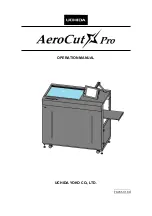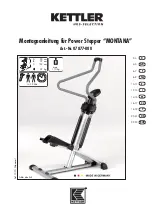
19
KNOWING YOUR SEWING MACHINE
CONOZCA SU MAQUINA DE COSER
18
Twin Needle Sewing
Your sewing machine is designed for twin needle
sewing, which allows you to sew with two top threads.
You can use the same color or two different colors of
thread for making decorative stitches. Any of the
patterns, except the buttonhole pattern, can be sewn
with the twin needle. When using the Straight Stitch,
the Stitch Width Dial should be set so that the needle
is in the center position (between 2 and 3). However,
when other patterns are used, set the Stitch Width
Dial between 0 and 3. See page 11 for details on
adjusting the Stitch Width Dial.
CAUTION:
When sewing with the twin needle, be sure the Stitch
Width Dial is not set above 3 since this may cause the
needle to hit the needle plate and break.
INSERTING THE TWIN NEEDLE
Insert in the same way a single needle is inserted
(refer to page 6). The flat side of the needle should
face toward the back and the rounded side should
face toward you.
PLACING THE EXTRA SPOOL PIN
Place the vertical spool pin in the hole found on top
of the machine near the horizontal spool pin. Place
the second spool of thread onto the vertical spool pin
as shown in
fig. A
.
TWIN NEEDLE THREADING
Each needle should be threaded separately.
1. Threading the Right Needle
Follow the same instructions for single needle
threading using the thread from the spool on the
extra spool pin. See page 16 for more details.
2. Threading the Left Needle
Thread the left needle in the same manner that
the right needle was threaded, but do not pass the
thread through the thread guide above the needle
before passing it through the eye of the left needle
as shown below in
fig. B
.
1
Right needle thread passes through this
guide.
2
Left needle thread in front of this guide.
Costura con aguja doble
Su máquina de coser ha sido concebida para poder
utilizar una aguja doble y permitir la costura con dos
hilos superiores. Puede usar el mismo color de hilo
o dos hilos de colores distintos para puntadas deco-
rativas. La aguja doble permite coser cualquiera de
los patrones, exceptuando él para hacer ojales. Sin
embargo, cuando selecciona la puntada recta, el
selector de ancho de puntada debe estar ajustado
de tal forma que la aguja se encuentre en la posición
central (entre 2 y 3). Para los otros modelos de
puntadas, dicho selector puede estar ajustado entre
0 y 3. Véase la página 11 para mayores detalles
sobre el ajuste del selector de ancho de puntada.
ATENCION:
Al coser con una aguja doble, debe asegurarse que el
selector de ancho de puntada no está ajustado en un
valor superior a 3 ya que en esas circunstancias, la
aguja podría golpear la placa de agujas y romperse.
Para introducir la aguja doble.
Introdúzcala de la misma manera que una aguja
simple (véase página 6). La parte plana de la aguja
debe estar cara hacia atrás mientras que la parte
redonda está cara a usted.
Colocado el eje de carrete suplementario
Coloque el eje de carrete vertical en el orificio
previsto arriba de la máquina, cerca del eje horizon-
tal. Instale el segundo carrete de hilo en el eje
vertical, tal como ilustrado en la
fig. A
.
Enhebrado de la aguja doble
Cada una de las agujas debe ser enhebrada por
separado.
1. Enhebrado de la aguja derecha
Observe las mismas instrucciones que para el
enhebrado de una sola aguja, pero utilizando el
hilo del carrete colocado en el porta carretes
extra. (véase página 16 para mayores detalles al
respecto).
2. Enhebrado de la aguja izquierda
Enhebre la aguja izquierda de la misma manera
que la aguja derecha. Sin embargo, no hay que
pasar el hilo por la guía que se sitúa arriba de la
aguja. Conviene pasarlo directamente por el ojo
de la aguja izquierda, tal como ilustrado arriba en
la
fig. B
.
1
El hilo de la aguja derecha pasa por la
guía.
2
El hilo de la aguja izquierda pasa delante
de la guía.
1
2
A
B
Summary of Contents for XL-3010
Page 1: ... OPERATION MANUAL MANUAL DE INSTRUCCIONES ...
Page 57: ...53 NOTE ...
Page 58: ...NOTA ...
Page 59: ...English Spanish 194256 111 Printed in Taiwan ...
















































